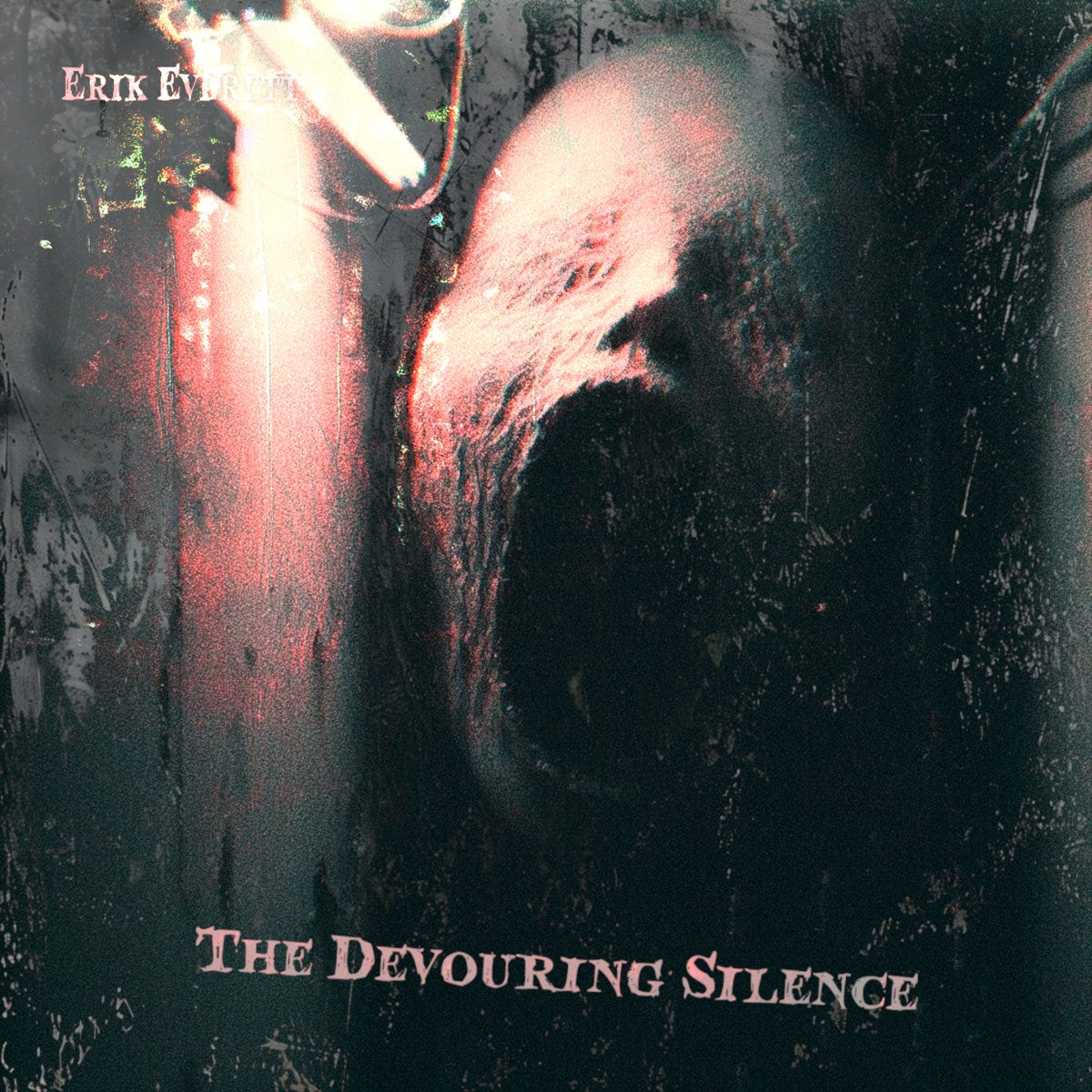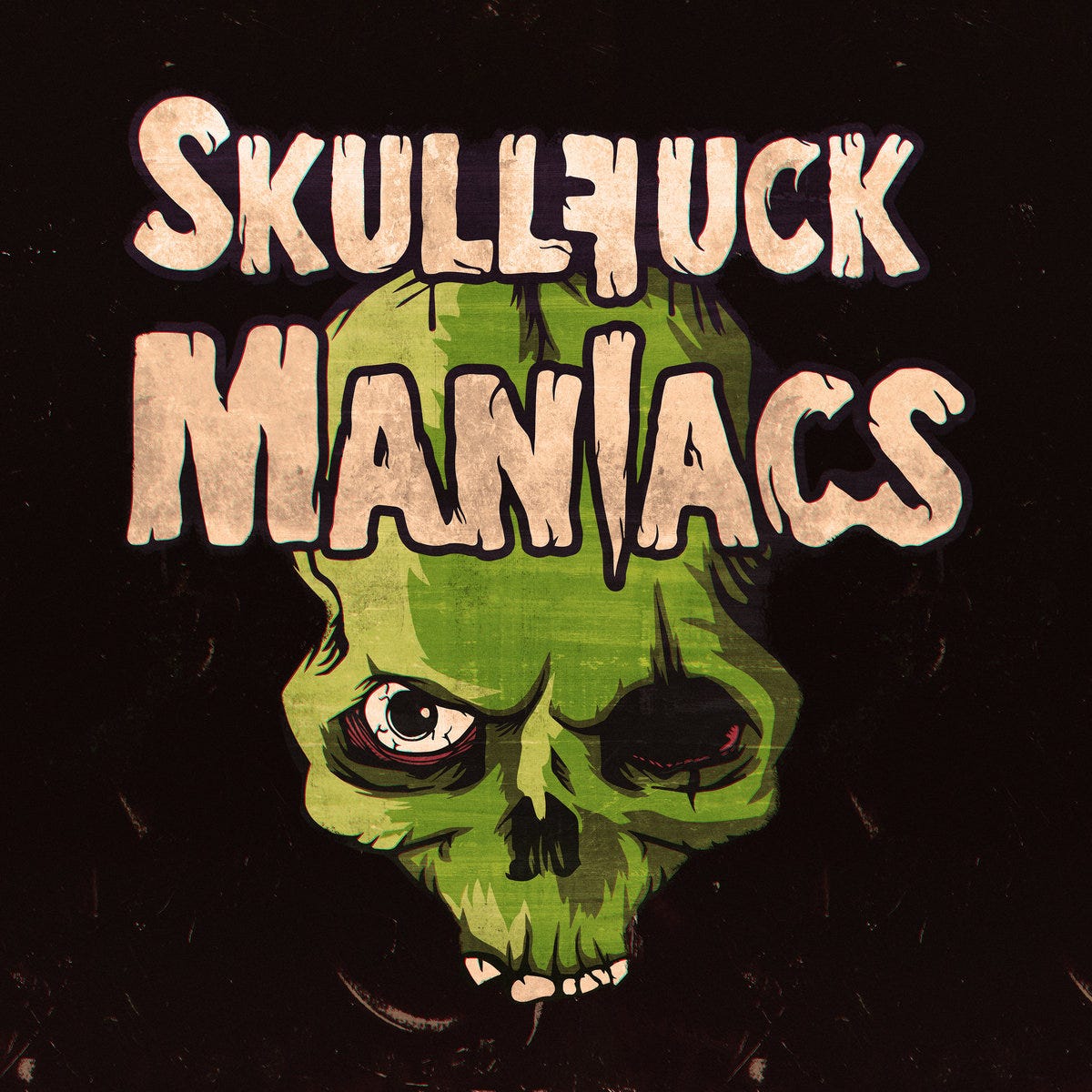Maybe it’s just me, but it feels like Halloween’s not getting as much attention this year. Perhaps it’s because of a looming, fraught presidential election, back-to-back hurricanes, and dispiriting wars in the Middle East and Ukraine?
But this is Band Name Bureau, and October means Halloween music. So, for a moment, let us stop doomscrolling to appreciate the season’s bounty.
Kicking things off is November Nepenthe of Spokane, Washington. That’s sole member George D. Lovecraft above, and this photo immediately hooked me.
Why yes, I did zoom in on the books. The easiest to make out is Psychic Self-Defense: The Definitive Manual for Protecting Yourself Against Paranormal Attack by Dion Fortune, a nearly 100-year-old tome that teaches “how to understand the signs of a psychic attack, vampirism, hauntings, and methods of defense.” Fortune was a famous occult writer, but one review of the book noted that what Dion described as a “psychic attack” in 1930 sounds a lot like PMS today.
There’s also William Peter Blatty’s The Exorcist (naturally), The Complete Book of Werewolves by Leonard R.N. Ashley1, and Thee Psychick Bible by industrial music icon and weirdo genius Genesis P-Orridge of Throbbing Gristle. Squint and you’ll see Prometheus Rising by counter-culture figure Robert Anton Wilson, too. Wikipedia says it “includes explanations of Timothy Leary’s eight-circuit model of consciousness, Alfred Korzybski’s general semantics, Aleister Crowley’s Thelema, and various other topics related to self-improvement, occult traditions, and pseudoscience.” Frankly, I’m surprised we made it this long without Aleister Crowley coming up.
Knowing all of this now, you will not be surprised to see this November Nepenthe cover art:
Nor will you be surprised by its unwieldy title: Delta Lupus - Blood, Urine, Semen, and a Black Widow. Lovecraft describes it as “10 slabs of terror-tainment and dread-soaked sonic sculpture” featuring “Richard Ramirez, satanic-panic moral outrage, Hollywood sex-trafficking, spirit-cookers, and Geraldo Rivera.” The tracks are “raw, somewhat produced, mostly mastered, claustrophobic & paranoid—like you.”
Lovecraft has released numerous albums since this one came out in 2018, notably the Nuke The Dead Halloween Special in 2022. There’s a nearly 300-word story that accompanies it—tl;dr: an archaeological dig in Turkey turns up evidence of an advanced civilization, unleashing evil upon the world—but it doesn’t explain why one song is simply called “Christopher Lee.”2
Lovecraft and November Nepenthe offer so much to unpack, but we must move on. As far as the name goes, Merriam-Webster defines “nepenthe” as “a potion used by the ancients to induce forgetfulness of pain or sorrow.” Depending on how things go on 11/5, we may all want our own November nepenthe, am I right, folks?
Lovecraft’s unsmiling visage notwithstanding, the notes accompanying his releases indicate some sense of levity, if not humor. That’s decidedly not the case for The Devouring Silence by Erik Everett. The cover tells you as much.
“I thought this was a newsletter about band names,” you say. “Erik Everett is just some guy.” True and true. But in this special Halloween edition of Band Name Bureau, all manner of silliness is on the table. Everett clearly doesn’t intend to be silly, but let’s scroll through the tracks:
“Descent into the Void,” “Dancing Through the Crypts,” “Whispers of the Asylum,” “Tales from the Dead Wasteland”—parts one and two—it goes on and on. When you bury the needle on the Goth-o-Meter like that, the results can’t help but look comical.
That goes double for the album notes, which are so over-serious they are, again, funny.
From the very first notes, the listener is pulled into a world where the boundaries between the tangible and the ethereal blur, allowing the mind to wander freely through a labyrinth of sonic textures and drifting tones.
(Atlas Obscura lists several labyrinths you can visit, so now you have the perfect soundtrack for wandering around, say, the Smith Memorial Labyrinth in the medieval city of Terre Haute, Indiana!)
Opening track “Descent into the Void” “becomes increasingly unsettling” as it goes on, “as if the very fabric of reality is beginning to unravel.” The unease that follows “lingers long after the music has faded, leaving the listener in a contemplative state, pondering the mysteries of existence.”
It goes on like this for 135 more words that read like twice as many. The capper: It’s bylined “Seymour Hiney.”
Mssr. Hiney touts The Devouring Silence as “a true masterpiece of dark horror ambient composition,” which made me wonder: How many dark horror ambient compositions can there be, masterpiece or otherwise? Plenty, it turns out, and many tag their music Halloween.
Garden of Hellish Delights puts it out there right away with Ambient Evil, an album that “invites you into a realm of shapeless horrors beyond comprehension.” Gaze, if you dare, into “places from the subconscious which seem somehow familiar, but existed before the universe and are still somewhere in the darkness of space.”
The only way to truly capture these “nightmares planted in the garden of the subconscious” is to turn off the lights, settle in, and queue up… “Christmas Shopping at Night.”
Wait, what?
Wander through a big box store shortly before closing time, fruitlessly searching for something that’s out of stock! Shop online into the wee hours, realizing only after it’s too late that you put in the wrong address for your nephew’s gift! Bwahahahaha, it’s AMBIENT EVIL!
Or maybe you’re into the Great Pumpkin-meets-biblical-curse vibes of A Pestilence in the Pumpkin Patch by Autumnal Graves.
It’s far more festive than these other evil drone types, with alliterative song titles like “The Wails of the Wampyrs,” “The Lumbering Lycanthrope,” and “Bloody Blade of the Butcher,” all crafted using analog synthesizer emulators. That’s neat and all, but it sounds like they’re emulating a fart in the title track.
Less Halloween-focused is To Leave Thy Light Behind by Shelter Ov Shadows, another dark ambient project by Autumnal Graves’ J. Browne. It’s not festive, but the album is “dedicated to the night sky and to the darkness and emptiness that lay betwixt and beyond,” so it’s Halloween adjacent.
After all of this purple prose, I think we need to get back to basics. In the world of Band Name Bureau, that means a group with a name like Skullfuck Maniacs.
Of the many iterations of the “fuck,” we can agree that “skullfuck” is among the most evocative. Here, let Gunnery Sergeant Hartman paint you a picture:
Adding “skull” significantly escalates “fuck.” If the band were called Fuck Maniacs or Fucking Maniacs, it would barely register. But calling themselves Skullfuck Maniacs takes it up several notches. Suddenly they’re not random crazy people, but crazy people who have a psychotic compulsion to penetrate your ocular cavities. (Unsurprisingly, the group identifies as horrorpunk.)
The band hails from Berlin, and living there gives the name Skullfuck Maniacs a bit of breathing room. While I’m sure most Berliners recognize “fuck,” fewer probably know what “skull” means. Maybe there’s a reason these dudes don’t go by “Schädel-fickende Wahnsinnige,” which Google translates to “skull-fucking maniacs.”
Even for Band Name Bureau, this is a lot of talk about skull-fucking, so let’s move onto their bio. It notes the group has a “variety of influences,” primarily “the original Misfits and ’90s Misfits.” A couple others follow, but when you listen to their music, you realize the description could’ve stopped right there.
Even the Misfits would be too timid to talk about skull-fucking. As for Band Name Bureau, let’s go at least six months without bringing it up again.
POST-SCRIPTS
George D. Lovecraft has another project, Wee Chapel of the Dawn. That name makes me picture the Precious Moments Chapel, a religious tourist trap in Carthage, Missouri, devoted to Samuel J. Butcher’s saccharine figurines. We passed it during our drive up to Chicago this summer, and I regret not stopping.
Speaking of ocular cavities…
Next month is the annual Band Name Bureau thanks list! That’s when we pause what we’re doing to give thanks for this year’s many blessings. (It’s a year in review, in other words.)
I originally read this as “Ashley Leonard, R.N.” and was disappointed to learn the truth.
I can guess why, considering Lee acted in a ton of cult movies—including serving as narrator for 1976’s Meatcleaver Massacre—and released a “symphonic metal concept album” called Charlemagne: By the Sword and the Cross in 2010.










